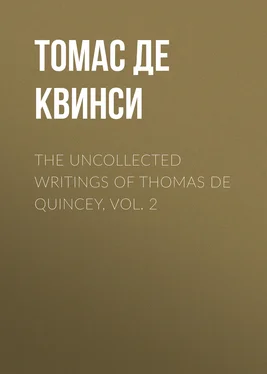Томас Де Квинси - The Uncollected Writings of Thomas de Quincey, Vol. 2
Здесь есть возможность читать онлайн «Томас Де Квинси - The Uncollected Writings of Thomas de Quincey, Vol. 2» — ознакомительный отрывок электронной книги совершенно бесплатно, а после прочтения отрывка купить полную версию. В некоторых случаях можно слушать аудио, скачать через торрент в формате fb2 и присутствует краткое содержание. Жанр: foreign_prose, literature_19, foreign_antique, на английском языке. Описание произведения, (предисловие) а так же отзывы посетителей доступны на портале библиотеки ЛибКат.
- Название:The Uncollected Writings of Thomas de Quincey, Vol. 2
- Автор:
- Жанр:
- Год:неизвестен
- ISBN:нет данных
- Рейтинг книги:3 / 5. Голосов: 1
-
Избранное:Добавить в избранное
- Отзывы:
-
Ваша оценка:
- 60
- 1
- 2
- 3
- 4
- 5
The Uncollected Writings of Thomas de Quincey, Vol. 2: краткое содержание, описание и аннотация
Предлагаем к чтению аннотацию, описание, краткое содержание или предисловие (зависит от того, что написал сам автор книги «The Uncollected Writings of Thomas de Quincey, Vol. 2»). Если вы не нашли необходимую информацию о книге — напишите в комментариях, мы постараемся отыскать её.
The Uncollected Writings of Thomas de Quincey, Vol. 2 — читать онлайн ознакомительный отрывок
Ниже представлен текст книги, разбитый по страницам. Система сохранения места последней прочитанной страницы, позволяет с удобством читать онлайн бесплатно книгу «The Uncollected Writings of Thomas de Quincey, Vol. 2», без необходимости каждый раз заново искать на чём Вы остановились. Поставьте закладку, и сможете в любой момент перейти на страницу, на которой закончили чтение.
Интервал:
Закладка:
This commanding tone was worthy of Lord Palmerston, and in harmony with his public acts in all cases where he has understood the ground which he occupied. Unhappily he did not understand the case of Canton. The British were admitted by each successive treaty, their right of entry was solemnly acknowledged by the emperor. Satisfied with this, Lord Palmerston said, 'Enough: the principle is secured; the mere details, locally intelligible no doubt, I do not pretend to understand. But all this will come in time. In time you will be admitted into Canton. And for the present rest satisfied with having your right admitted, if not as yet your persons.' Ay, but unfortunately nothing short of plenary admission to British flesh and blood ever will satisfy the organised ruffians of Canton, that they have not achieved a triumph over the British; which triumph, as a point still open to doubt amongst mischief-makers, they seek to strengthen by savage renewal as often as they find a British subject unprotected by armed guardians within their streets. In those streets murder walks undisguised. And the only measure for grappling with it is summarily to introduce the British resident, to prostrate all resistance, and to punish it by the gallows 4 4 ' By the gallows: '—Or much rather by decapitation. Accordingly, we read of a Ming ( i. e. , native Chinese) emperor, who (upon finding himself in a dreadfully small minority) retired into his garden with his daughter, and there hanged both himself and the lady. On no account would he have decapitated either; since in that case the corpses, being headless, would in Chinese estimation have been imperfect.
where it proceeds to acts of murder. It is sad consideration for those, either in England or China, who were nearly or indirectly connected with Canton (amongst whom must be counted the British Government), that beyond a doubt the murders of our countrymen, which occurred in that city, would have been intercepted by such a mastery over the local ruffians as could not be effected so long as the Treaty of Nanking was not carried into effect with respect to free entrance and residence of British subjects. As things stood, all that Sir J. Davis could do, in obedience to the directions from the Home Government, was to order a combined naval and military attack upon all the Chinese forts which belt the approaches to Canton. These were all captured; and the immense number of eight hundred and twenty-seven heavy guns were in a few hours made unserviceable, either by knocking off their trunnions, or by spiking them, or in both ways. The Imperial Commissioner, Keying, previously known so favourably to the English by his good sense and discretion, had on this occasion thought it his best policy to ignore Lord Palmerston's letter: a copy had been communicated to him; but he took not the least notice of it. If this were intended for insolence, it was signally punished within a few hours. It happened that on our English list of grievances there remained a shocking outrage offered to Colonel Chesney, a distinguished officer of the engineers, 5 5 ' Colonel Chesney: '—The same, I believe, whose name was at one time so honourably known in connection with the Euphrates and its steam navigation.
and which to a certainty would have terminated in his murder, but for the coming up at the critical moment of a Chinese in high authority. The villains concerned in this outrage were known, were arrested, and (according to an agreement with our plenipotentiary) were to be punished in our presence. But in contempt of all his engagements, and out of pure sycophantic concession to the Canton mob, Keying notified that we the injured party were to be excluded. In that case no punishment at all would have been inflicted. Luckily, our troops and our shipping had not yet dispersed. Sir J. Davis, therefore, wrote to Keying, openly taxing him with his breach of honour. 'I was going' [these were Sir John's words] 'to Hong-Kong to-morrow; but since you behave with evasion and bad faith, in not punishing the offenders in the presence of deputed officers, I shall keep the troops at Canton, and proceed to-morrow in the steamer to Foshan, where, if I meet with insult, I will burn the town.' Foshan is a town in the neighbourhood of Canton, and happened to be the scene of Colonel Chesney's ill usage. Now, upon this vigorous step, what followed? Hear Sir John:—'Towards midnight a satisfactory reply was received, and at five o'clock next morning three offenders were brought to the guard-house—a mandarin of high rank being present on the part of the Chinese, and deputed officers on the part of the British. The men were bambooed in succession by the Chinese officers of justice;' and at the close of the scene, the mandarin (upon a requisition from our side) explained to the mob who crowded about the barriers why the men were punished, and warned them that similar chastisement for similar offences awaited themselves. In one point only the example made was unsatisfactory: the men punished were not identified as the same who had assaulted Colonel Chesney. They might be criminals awaiting punishment for some other offence. With so shuffling a government as the Chinese, always moving through darkness, and on the principles of a crooked policy, no perfect satisfaction must ever be looked for. But still, what a bright contrast between this energy of men acquainted with the Chinese character, and the foolish imbecility of our own government in Downing Street, who are always attempting the plan of soothing and propitiating by concession those ignoble Orientals, in whose eyes all concession, great or small, through the whole scale of graduation, is interpreted as a distinct confession of weakness. Thus did all our governments: thus, above all others, did the East India Company for generations deal with the Chinese; and the first act of ours that ever won respect from China was Anson's broadsides, and the second was our refusal of the ko-tou . Thus did our Indian Government, in the early stages of their intercourse, deal with the Burmese. Thus did our government deal with the Japanese—an exaggerated copy of the Chinese. What they wanted with Japan was simply to do her a very kind and courteous service—namely, to return safe and sound to their native land seven Japanese who had been driven by hurricanes in continued succession into the Pacific, and had ultimately been saved from death by British sailors. Our wise government at home were well aware of the atrocious inhospitality practised systematically by these cruel islanders; and what course did they take to propitiate them? Good sense would have prescribed the course of arming the British vessel in so conspicuous a fashion as to inspire the wholesome respect of fear. Instead of which, our government actually drew the teeth of the particular vessel selected, by carefully withdrawing each individual gun. The Japanese cautiously sailed round her, ascertained her powerless condition, and instantly proceeded to force her away by every mode of insult; nor were the unfortunate Japanese ever restored to their country. Now, contrast with this endless tissue of imbecilities, practised through many generations by our blind and obstinate government (for such it really is in its modes of dealing with Asiatics), the instantaneous success of 'sharp practice' and resolute appeals to fear on the part of Sir John Davis. By midnight of the same day on which the British remonstrance had been lodged an answer is received; and this answer, in a perfect rapture of panic, concedes everything demanded; and by sunrise the next morning the whole affair has been finished. Two centuries, on our old East Indian system of negotiating with China, would not have arrived at the same point. Later in the very same year occurred another and more atrocious explosion of Canton ruffianism; and the instantaneous retribution which followed to the leading criminals, showed at once how great an advance had been made in winning respect for ourselves, and in extorting our rights, by this energetic mode of action. On Sunday, the 5th of December, six British subjects had gone out into the country on a pleasure excursion, some of whom unhappily carried pocket-pistols. They were attacked by a mob of the usual Canton character; one Chinese was killed and one wounded by pistol-shots; but of the six British, encompassed by a countless crowd, not one escaped: all six were murdered, and then thrown into the river. Immediately, and before the British had time to take any steps, the Chinese authorities were all in motion. The resolute conduct of Sir John Davis had put an end to the Chinese policy of shuffling, by making it no longer hopeful. It lost much more than it gained. And accordingly it was agreed, after a few days' debate, that the emperor's pleasure should not be taken, except upon the more doubtful cases. Four, about whose guilt no doubts existed, were immediately beheaded; and the others, after communicating with Peking, were punished in varying degrees—one or two capitally.
Интервал:
Закладка:
Похожие книги на «The Uncollected Writings of Thomas de Quincey, Vol. 2»
Представляем Вашему вниманию похожие книги на «The Uncollected Writings of Thomas de Quincey, Vol. 2» списком для выбора. Мы отобрали схожую по названию и смыслу литературу в надежде предоставить читателям больше вариантов отыскать новые, интересные, ещё непрочитанные произведения.
Обсуждение, отзывы о книге «The Uncollected Writings of Thomas de Quincey, Vol. 2» и просто собственные мнения читателей. Оставьте ваши комментарии, напишите, что Вы думаете о произведении, его смысле или главных героях. Укажите что конкретно понравилось, а что нет, и почему Вы так считаете.












